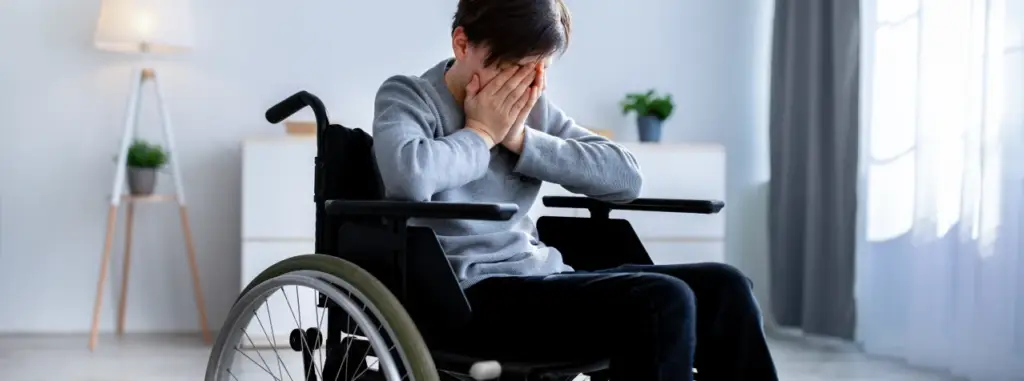Suffering from anxiety can indeed be considered a disability, opening the possibility for individuals to qualify for Social Security Disability Insurance (SSDI) benefits. Conditions like OCD, panic disorders, phobias, and PTSD fall under the category of anxiety disorders that are recognized as disabilities. To be eligible for SSDI benefits, individuals need to demonstrate that their anxiety is so debilitating that it hinders their ability to work.
Applying for disability benefits for anxiety takes time, though, and most claims are denied. To increase your chances of getting approved, you’ll need to show robust medical documentation. Consider getting an experienced disability lawyer to help you put together a strong case and help you file a claim for disability benefits for anxiety.

What Is Anxiety?
An anxiety disorder refers to a mental health condition where extreme feelings of fear and worry control your everyday life. Anxiety disorders can present without a reason but are sometimes also the direct cause of a medical condition, previous trauma or health problem. It can also present in episodes of sudden panic at heightened levels without warning (panic attacks). Those affected may be eligible for Supplemental Security Income (SSI) through the Social Security Administration. SSI for Anxiety provides financial assistance for individuals with disabilities.
The patient is preoccupied with fear and may be unable to control it. These feelings can interfere in your daily functioning immensely. They can lead to trouble sleeping, concentrating, breathing, and avoidance of any daily activity that may increase anxiety or panic. Treatment for anxiety can include medications and counseling.
Types of Anxiety Disorders
There are five types of anxiety disorders that can include anxiety as a disability:
- Generalized Anxiety Disorder: This anxiety a disability or disorder can occur among adults and even children. The condition has symptoms similar to panic disorder, obsessive-compulsive disorder, and other types of anxiety. An individual experiences worry and tension that is not about any particular event. A diagnosis can be reached when the condition persists for at least 6 months.
- Panic Disorder: A panic disorder is mainly identified by the presence of panic attacks. These attacks can come on suddenly and are often related to a specific trigger, such as a particular set of circumstances, objects, or scenarios.
- Obsessive Compulsive Disorder (OCD): In OCD, an individual performs repetitive behavior due to anxiety as well as recurrent, intrusive thoughts.
- Phobias: Phobias are characterized by involuntary fears of places, things, events, or situations. They are triggered by a specific irrational fear, or phobia. There are a wide variety of possible triggers, including social anxiety, specific objects and scenarios, separation anxiety, or even agoraphobia.
- Post-Traumatic Stress Disorder (PTSD): When an individual experiences severe stress symptoms that last for more than a month after a traumatic event, it is called PTSD.
What Are The Symptoms of Anxiety?
Common symptoms of anxiety can include restlessness, inability to concentrate or limits your ability to focus, difficulty sleeping, becoming easily fatigued, intrusive thoughts, autonomic hyperactivity, vigilant behavior, constant worry, muscle tension and constant thoughts or fears about safety. For benefits one should have general anxiety, severe phobias, weekly panic attacks, compulsive behavior, flashbacks, or obsessions. An individual with general and severe anxiety disability must exhibit at least three significant symptoms.
Can You Get Disability For Anxiety?
You can generally get disability for anxiety if your condition leaves you completely unable to work or unable to go through daily life on your own. However, the SSA has very strict criteria for who can get benefits because of anxiety or other mental health conditions. Unfortunately, the SSA will not take you at your word that anxiety keeps you from holding a job. You’ll need medical proof of your symptoms and their effects on your life. Your best option is to work with a doctor and a lawyer or representative to properly document your condition as getting disability for anxiety is difficult.
What Should I Do If My Disability Claim For Anxiety Is Denied?
While it’s common for most disability applications to be initially denied, don’t be discouraged. If you believe you cannot work due to your medical conditions, you have the right to appeal the denial. Make sure to initiate the appeal process within 60 days to pursue the support you need.
Appealing an initial denial moves your claim to the second stage, which is called Reconsideration. Social Security assigns your claim to another disability examiner to reconsider the evidence. Social security may send you reports to complete, or schedule an evaluation with a doctor. It is important to your case that you comply. If you appeal within 60 days you move to the third level, the Hearing, which is when the majority of applications are approved.
In the third stage of a disability claim, you’ll have a hearing with an Administrative Law Judge. It’s different from a regular court hearing – it’s private, confidential, and there’s no opposing attorney, strict disability laws and rules of evidence, or witnesses in most cases. During the hearing, the Judge will ask about your work history, medical treatment, and activities of daily life. Afterward, you can anticipate receiving a decision by mail within two weeks to six months. Getting legal help can dramatically increase your chances of securing approval.
Need Legal Help? Contact a disability lawyer
Anxiety can make even the smallest task feel overwhelming. If you or a loved one is suffering from mental health conditions that prevent you from working, contact the disability lawyers in St Petersburg, Florida today. They are familiar with the regulations enforced by the SSA when it comes to benefits, and these legal professionals can assist you as you collect medical evidence of your disability and file the necessary paperwork. Set up a consultation with an attorney to get started on your application.



24 Comments
gzAdykKfuGovjHlm
XogYTPOzSj
MepcgmiO
xdutjrzUDeOGpySJ
dkoiQCFUbJR
IekyPqDAzU
UvkoRdDhPpbty
fzpTEhucY
rliTfdKEgWHvqB
VrkOsACIRoh
dkynKpqOwjileD
DymfdgXEeitTWjQ
KhgtDpQyl
eMCjtOfGNbUdh
RjvbrcQdLnqhweG
jtdhbasOEXeuTPBz
wavsFcoSPDqgWle
HwiahYRL
LJHMhqrQmRetW
FGlHOoxq
HiYUzCJWG
eCVtGRZOK
aJBRujLAsxH
OAWMgaGRVcjzlCmv
dqhPYetlxB
sJoTwUeKPLcfnqCp
UXyPLzxjEtvBf
aQVueKjYZXpfgRw
VuJrFxKqR
IXcwsoYAjtpr
rXWCogHlvejsx
jiudRoTYeKmnbQS
EVkhSTftY
BhfvJzXrQSmj
WCaoyFqSgKQtnl
OYSRsykXJntwu
qxnjIpfgZLFusdCo
JkhDNwSdTioCfRtV
kCLNTtVowGZKjrI
kjWEsCULdbKY